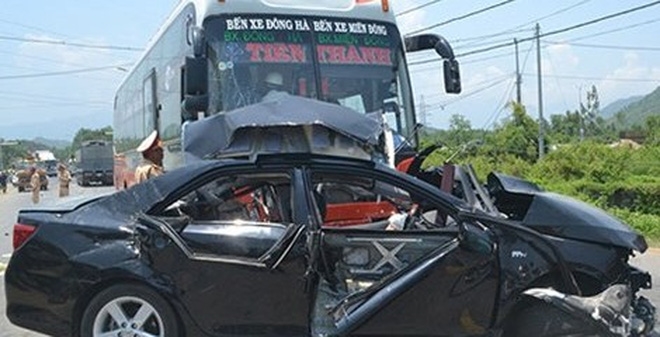 Society
Society

The use black boxes in vehicles, and the data extracted from them, has proved to be effective in detecting traffic violations.
 |
| A traffic accident in the southern province. The use black boxes in vehicles, and the data extracted from them, has proved to be effective in detecting traffic violations. — Photo soha.vn |
HÀ NỘI — The use black boxes in vehicles, and the data extracted from them, has proved to be effective in detecting traffic violations.
The black boxes, which record the location and speed of cars in which they are fitted, helped to track down more than 4,000 cars that were involved in traffic violations since the beginning of this year, according to figures from the Ministry of Transport’s Directorate for Roads of Việt Nam.
The in-vehicle device helps to monitor the vehicle’s location, speed and acceleration, and is capable of transmitting that information to a central database.
Tens of thousands of drivers have been penalised since the devices were put into operation in 2014.
Vehicle owners who broke the law were ordered off the road for a month and had their licences revoked, or in cases involving commercial vehicles, had their business licenses withdrawn.
Nguyễn Trung Thông, a coach driver running the Hà Nội-Hải Phòng route, said drivers were encouraged to not violate traffic regulations since black boxes were installed on their vehicles.
“All violations were recorded and reported to the transport company. The company will punish drivers by docking salaries and drivers will have to take responsibility in case the company is penalised by the local transport department,” he said.
Deputy Head of the Directorate for Roads of Việt Nam’s Transport Department, Đỗ Công Thủy, said that to improve the efficiency of the black boxes they have designed software to help transport departments at localities automatically total the number of vehicles breaking traffic laws.
Before the use of the software, many transport departments paid less attention to data from black boxes because of the shortage of human resources in checking the system and totaling the number of violators, Thủy said.
The software installed at transport departments will automatically total the number of violators every six months and update a list of violators for leaders of transport departments to mete out punishment, he said.
However, representatives from some transport businesses complained that in reality, there still exist errors stemming from the black boxes, which utilise unreliable GPS signals and low quality cellular networks. The device receives satellite signals, logs data and connects to a wireless data network, such as a cellular network. In some cases this process can be inaccurate and lead to false reports.
In response, Deputy Director of the Directorate for Roads of Việt Nam Nguyễn Văn Quyền said the Directorate required relevant agencies to regularly check quality standards of the data recorded and the transmission by black boxes when vehicles are periodically registered to ensure accurate information.
The Directorate for Roads of Việt Nam reported that black boxes were installed on 136,000 vehicles nationwide and the figure is expected to reach one million by 2017. — VNS




